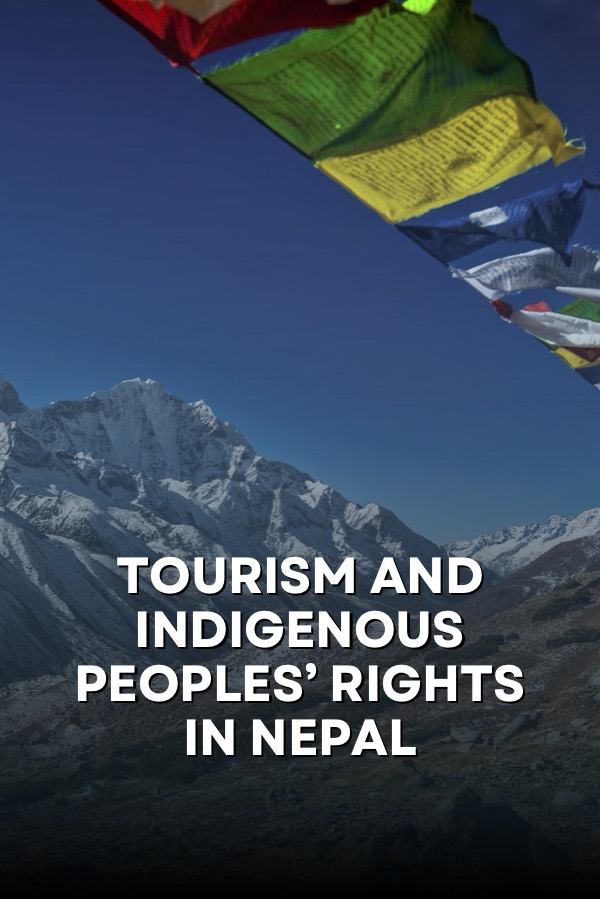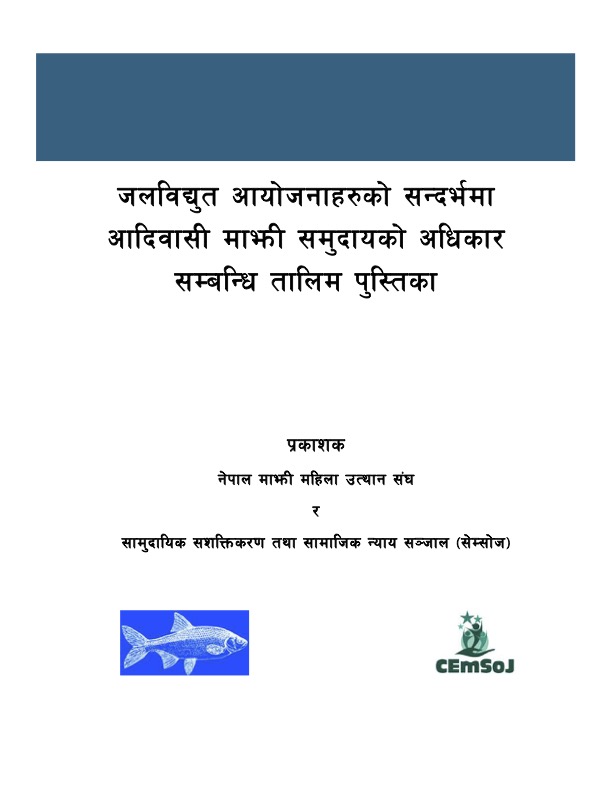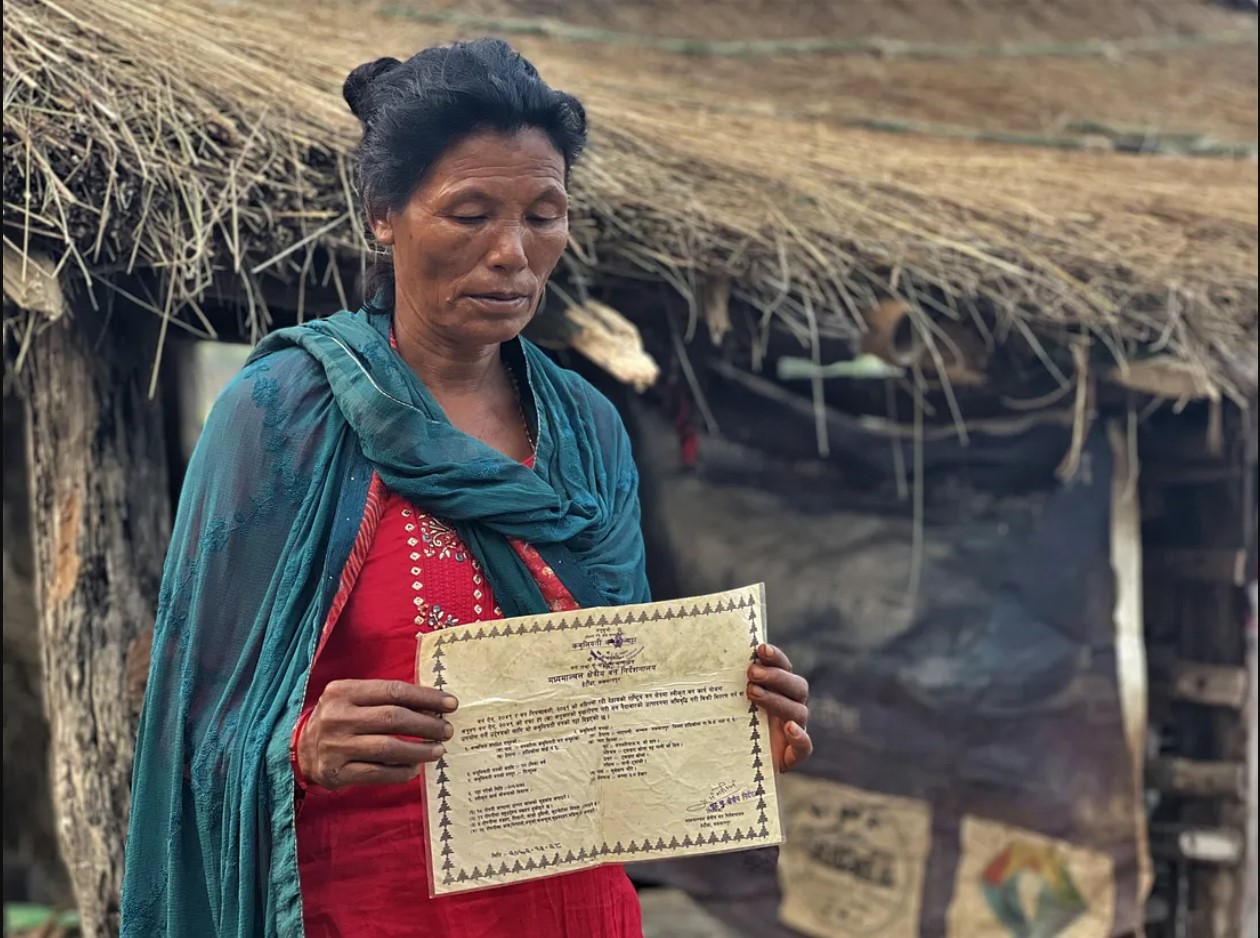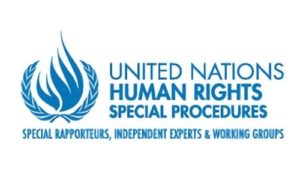Community Empowerment and Social Justice Network (CEMSOJ), Save Nepa Valley (SNV) Movement and Thāe Bāe Yā Lwāpu made a joint submission for the 4th Universal Periodic Review (UPR) of Nepal. The UPR is a unique process which involves a review of the human rights records of all UN Member States and is held under the auspices of the UN Human Rights Council. The submission presents key human rights challenges faced by indigenous Newa communities, particularly in the context of “development” and business projects in Nepal and the systematic violations of rights to housing and property as well as cultural rights of the Jugi community within the Indigenous Newa nationality of Nepal. It also examines the compliance of the Government of Nepal with relevant recommendations received during the 3rd and 2nd UPR cycles of Nepal related to the rights of Newa and other Indigenous nationalities.
more “Joint submission on the human rights situation of Indigenous Newa communities made to the UN for the 4th Universal Periodic Review of Nepal”Tag: indigenous
स्विस सरकारद्वारा भिएफ़एस ग्लोबललाई काठमाडौंस्थित छाया सेन्टर व्यापारबाट जिम्मेवारीपूर्वक सर्न सिफारिस
भिसा फेसिलितेसन सर्विसेस (भिएफ़एस) ग्लोबल विरुद्ध दुई नेपाली संस्थाहरूले दायर गरेको उजुरीको जवाफमा स्विस सरकारको नेशनल कन्त्याक्त पोइन्ट (National Contact Point – एनसीपी)ले भिएफ़एस ग्लोबललाई काठमाडौंको पर्यटकीय क्षेत्र ठमेलमा रहेको छाया सेन्टरसँगको भाडा करार सम्झौता जिम्मेवारीपूर्वक अन्त्य गर्न सिफारिस गरेको छ।
जुरिकमा मुख्यालय रहेको भिएफ़एस ग्लोबल (VFS Global) विरुद्ध २५ अगस्ट २०२४ मा स्विट्जरल्याण्ड सरकारको आर्थिक मामिला सचिवालय (State Secretariat of Economic Affairs) मातहतको जिम्मेवार व्यापार आचरणको लागि नेशनल कन्त्याक्त पोइन्ट (National Contact Point (NCP) for Responsible Business Conduct) मा उजुरी पेश गरिएको थियो। उजुरीमा भिएफ़एस ग्लोबलले छाया सेन्टरमा आफ्नो संलग्नताको लागि प्रभावकारीरुपमा मानवअधिकारको मुल्यांकन (human rights due diligence) नगरेको र छाया सेन्टरमा निरन्तर कार्यालय सञ्चालन गरी आदिवासी नेवा: समुदायको मानवअधिकारमा नकारात्मक असर पारेकोले जिम्मेवार व्यापार आचरणसम्बन्धि बहुराष्ट्रिय कम्पनिहरूको लागि ओइसीडीका दिशानिर्देशन (OECD Guidelines for Multinational Enterprises on Responsible Business Conduct) को उल्लङ्घन गरेको आरोप लगाइएको थियो।
more “स्विस सरकारद्वारा भिएफ़एस ग्लोबललाई काठमाडौंस्थित छाया सेन्टर व्यापारबाट जिम्मेवारीपूर्वक सर्न सिफारिस”Swiss National Contact Point recommends VFS Global to responsibly disengage from Chhaya Center business complex in Kathmandu
In response to a complaint filed by two Nepali organizations against Visa Facilitation Services (VFS) Global, the Swiss Government’s National Contact Point has recommended the company to disengage responsibly from its lease agreement with the Chhaya Center business complex in Kathmandu’s tourist district of Thamel.
The complaint (specific instance) against the VFS Global headquartered in Zurich was submitted to the National Contact Point (NCP) for Responsible Business Conduct within the State Secretariat of Economic Affairs of the Government of Switzerland on 25 August 2024. It alleged failures by the VFS Global to conduct effective human rights due diligence for its involvement in the Chhaya Center business complex and associated human rights impacts on the Indigenous Newar community through its continued operations in the complex in violation of the OECD Guidelines for Multinational Enterprises.
more “Swiss National Contact Point recommends VFS Global to responsibly disengage from Chhaya Center business complex in Kathmandu”जलविद्युत आयोजनाहरुको सन्दर्भमा आदिवासी माझी समुदायको अधिकार सम्बन्धि तालिम पुस्तिका
वि.सं. २०८१ चैत १५
जलविद्युत आयोजनाहरुको सन्दर्भमा आदिवासी माझी समुदायको अधिकार विषयक यस तालिम पुस्तिकाले आदिवासी माझी समुदायलाई सशक्त बनाउनको लागि एक बृहत् स्रोतको रुपमा काम गर्ने उद्देश्य लिएको छ । यसले जलविद्युत परियोजनाहरूको प्रभावको सन्दर्भमा समुदायको अधिकारको वकालतको लागि जनचेतना अभिबृद्धि र क्षमता विकासको लागि तत्काल रहेका आवश्यकताहरूलाई सम्बोधन गर्ने लक्ष्य राखेको छ । यो पुस्तिका माझी समुदायका अगुवा, अधिकार प्रतिरक्षक र अन्य मानवअधिकार तथा आदिवासी अधिकार प्रतिरक्षकहरूलाई सुनकोशी–३ र दुधकोशी जलविद्युत आयोजनाहरूको सम्बन्धमा बुझाई वृद्धि, अन्तर्राष्ट्रिय र राष्ट्रिय कानून अन्तर्गत आदिवासी जनजातिको अधिकारको प्राविधिक ज्ञान, व्यवहारिक वकालत, तालिम र जनचेतना अभिबृद्धिका लागि सीप विकासमा सहयोग गर्न तयार पारिएको छ ।
more “जलविद्युत आयोजनाहरुको सन्दर्भमा आदिवासी माझी समुदायको अधिकार सम्बन्धि तालिम पुस्तिका”भिएफ़एस ग्लोबल यथाशक्य छिट्टै छायाँ सेन्टरबाट सर्ने
भिसा फेसिलितेसन सर्विसेस (भिएफ़एस) ग्लोबल विरुद्ध स्विट्जरल्याण्ड सरकारसंग गरिएको उजुरीको जवाफमा भिएफ़एसले ९ डिसेम्बरमा स्विस सरकारलाई काठमाडौंको पर्यटकीय क्षेत्र ठमेलमा रहेको छाया सेन्टरमा रहेको आफ्नो कार्यालयको भाडा करार सम्झौता नवीकरण नगर्ने र यथाशक्य छिट्टै छाया सेन्टरको परिसरबाट आफ्नो कार्यलय स्थानान्तरण गर्ने निर्णय गरेको लिखित रूपमा जानकारी गराएको छ।
more “भिएफ़एस ग्लोबल यथाशक्य छिट्टै छायाँ सेन्टरबाट सर्ने”VFS Global decides “to relocate from the premises at the Chhaya Center [in Kathmandu] as soon as feasible”
In response to a specific instance (complaint) filed with the National Contact Point for Responsible Business Conduct (NCP) of Switzerland under the OECD Guidelines for Multinational Enterprises on Responsible Business Conduct against the Visa Facilitation Services (VFS) Global, the VFS on 9 December has reportedly informed the Swiss NCP in written that it has decided not to extend the lease and to relocate as soon as possible from the premises at the Chhaya Center business complex in Kathmandu’s tourist district of Thamel.
more “VFS Global decides “to relocate from the premises at the Chhaya Center [in Kathmandu] as soon as feasible””Displaced and Landless: Endangered Indigenous Bankariya living in the buffer zone of Parsa National Park in Nepal
This summary report aims to analyze the human rights challenges of Nepal’s endangered Indigenous Bankariya people, particularly to their lands and forest resources, due to Parsa National Park in the south of the country. Traditionally a nomadic group living in forests, Bankariyas were provided six hectares of leasehold forests, where they currently live in informal settlements. The leasehold forests were later incorporated in the buffer zone of the Parsa National Park. Almost two decades later, Bankariyas now face the same challenge as around 6 million people of 34 districts living in buffer zones of various protected areas of Nepal. They do not have titles to the lands that they have been living on, using or occupying for generations. As a result, they face threats of forced evictions and displacement from their current settlement upon expiry of their lease and in lack of land titles.
more “Displaced and Landless: Endangered Indigenous Bankariya living in the buffer zone of Parsa National Park in Nepal”Complaint filed against VFS Global regarding its involvement with Chhaya Center in Kathmandu with the Swiss government
On 25 August 2024, two anonymous Nepalese organisations filed a complaint against Visa Facilitation Services (VFS) Global with the National Contact Point (NCP) for Responsible Business Conduct within the State Secretariat of Economic Affairs of the Government of Switzerland. The complaint concerns the activities of VFS Global in Kathmandu, Nepal, related to its involvement with the Chhaya Center business complex (also known as Chhaya Devi Complex) in violation of the OECD Guidelines for Multinational Enterprises.
more “Complaint filed against VFS Global regarding its involvement with Chhaya Center in Kathmandu with the Swiss government”NEWS RELEASE – Nepal: Retaliations against human rights defenders over Chhaya Center business complex ‘deplorable’, say UN experts
GENEVA (14 May 2024) – UN experts* today expressed concern over reports of ongoing retaliations against human rights defenders because of their opposition to the development of the Chhaya Center retail and entertainment complex in Nepal.
Retaliatory acts against human rights defenders are “deplorable and unacceptable”, the experts said. “The targeting of human rights defenders for the sole exercise of their right to freedom of opinion and expression violates international human rights norms.”
more “NEWS RELEASE – Nepal: Retaliations against human rights defenders over Chhaya Center business complex ‘deplorable’, say UN experts”Case Study: Tourism and Indigenous Peoples’ Rights in Nepal
Tourism industry plays and can further play a significant role for Nepal’s economy and prosperity, including in terms of environmental conservation. However, the industry has often entrenched marginalization of Indigenous Peoples in the country and resulted in violations of their rights, including in the context of establishment of protected areas, tourism establishments and businesses as well as representation of Indigenous image.

On many occasions, Indigenous Peoples have suffered loss of traditional lands and other violations of their rights in favor of tourism projects, which directly affects their lives and livelihoods. Particularly relevant is the establishment of protected areas, which have been mostly created by displacing Indigenous communities from their lands and resources. Concerningly, Indigenous communities have even been subjected to wide range of abuses, including killings, torture, arbitrary detentions, mistreatment, harassment as well as sexual violence against women at the hands of army, forest rangers and others in the context protected areas set up for environmental conservation and tourism.
Tourism establishments and business have also encroached upon lands and sacred sites of Indigenous communities in various parts of Nepal. Indigenous defenders and activists have faced retaliations and reprisals for raising their voices against violations of their rights and those of their communities in the context of such tourism undertakings, including at the hands of businesses.
more “Case Study: Tourism and Indigenous Peoples’ Rights in Nepal”


